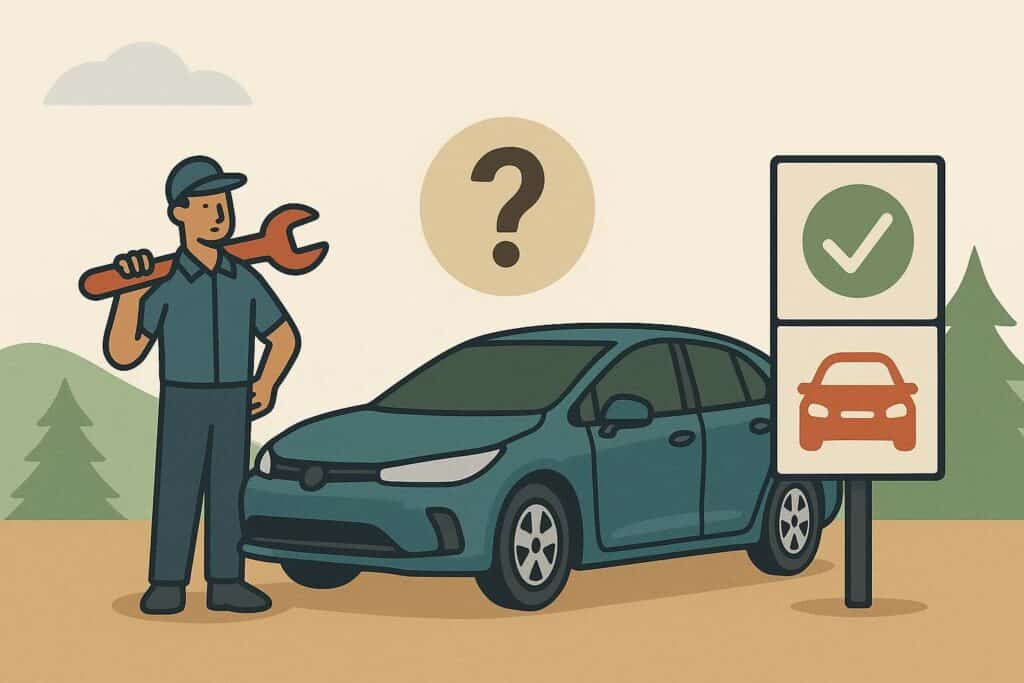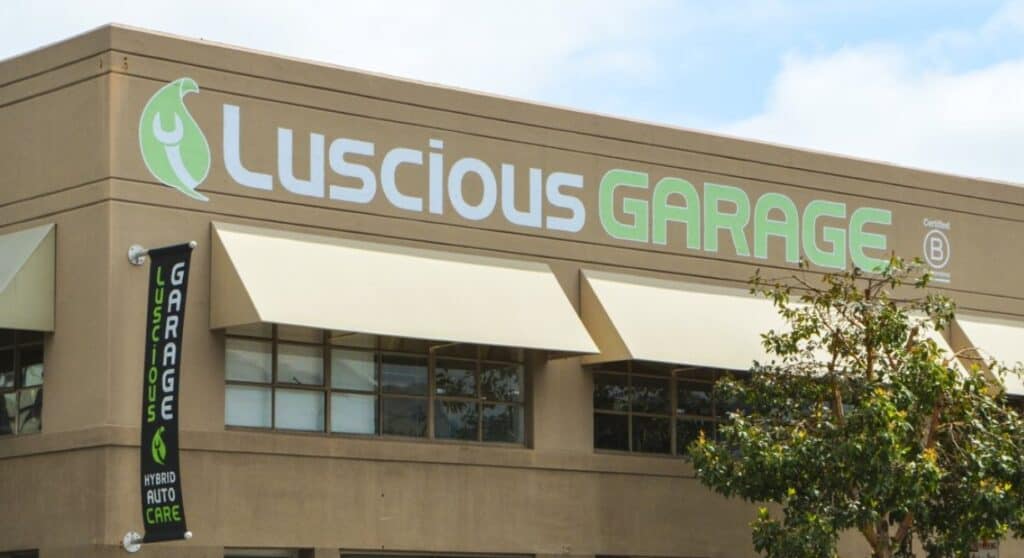
Earthling loves your current car, don’t get us wrong! But we’ve got best practices when the time ultimately comes to make a change.
Popular topics in this article:
- How long should you expect an older hybrid to last?
- If you get an EV, what one(s) does Earthling recommend (and what to avoid)?
- Best practices for purchasing a used car
How long should you expect an older hybrid to last?
When Prius first hit the road, many owners were upset when they needed anything at all. The joke around the shop was, “What does a Prius owner do within two weeks of buying it?” Punchline: “Run it out of gas.”
Yes, hybrids need gas. Heck, they even need engine oil! And with many over 100k (if not 200k) by now, these amazing machines are entitled to some wear and tear. The question is whether you want to pay the bill or pass the car to a new owner.
Catalytic converters aside, there are very few hybrid problems that genuinely exceed the value of the car.
- Hybrid battery replacement is typically cheaper than the vehicle value, especially for common hybrids (like Prius) still on the road today. Consider them maintenance items: every hybrid will need one eventually. While we can test a battery’s current condition, we cannot prognosticate when today’s good battery will go bad. If you’re curious about the failure pattern for your specific car (it varies based on model and driving pattern) shoot the shop a text at 415-875-9030 and we can give you our slant.
- Of the hybrids still kicking it today, the death knell is usually an internal engine problem that requires major repair. Earthling does offer head gaskets and engine swaps and it is not uncommon that owners choose to invest in their car to keep it for another 100k+ miles. But the price tag for one of these jobs is typically higher than the vehicle’s current resale price (refer to SFBA Craigslist instead of Kelly Blue Book). We cannot overemphasize the need for routine maintenance (yes, oil changes, but also coolant, spark plugs, etc.) to avoid these problems.
- Otherwise a hybrid may collect a list of needs that together add up to an uncomfortable amount of money. Our inspection process is meant to be comprehensive so you know the exact state of your car if/when you do decide to invest in it. Earthling staff will prioritize repairs and sequence them as necessary to manage costs. If you do decide to sell the car instead, you can disclose the information to a buyer as you wish.
The saying goes: the three professionals you really need are a priest, a doctor, and a mechanic. That said, you hope not to need any of them frequently. Hybrid or no, the tradeoff with older cars (“payments or problems” as they say) is a higher risk of unforeseen costs and inconvenience. We love older hybrids, precisely because they need our help! But for many hybrid owners that’s a new dynamic, one they’ve precisely been able to avoid, which may shake your confidence.
Economics are your consolation here: hybrids (especially Toyotas) are the most cost-efficient cars ever made. If you want to save money in the long term, don’t buy a new car: keep your well-maintained hybrid on the road.
If you get an EV, which one(s) does Earthling recommend (and what to avoid)?
For many leaving their hybrids behind, the next step is a pure electric car. These cars will be even lower on maintenance costs but may become problematic if/when things actually break.
Because EVs are comparatively new, repairs are not common as compared to “regular” cars. Even if a low-production model like the Fiat 500e always has a particular failure, it can be hard to source the replacement part for that failure (there’s not enough demand to justify making one, whether OE (from the dealer) or aftermarket). In those cases, we can only source something used (with a corresponding probability of failure).
Thus the primary thing to consider when purchasing an EV (used or new) is how many of the same models were made. This is where Tesla stands out (no matter your feelings about the company/leadership); they’ve outproduced EVs (particularly Models 3 and Y) compared to everyone else.
Parts are available on Teslas (including some aftermarket options), but dealers are notorious for parts’ availability delays. This is a reflection of the newness of the company (even if they’ve produced the most cars).
Your second-best-bet is to buy an EV with relatively high production numbers from a mainstream car company. In this case the standout winner is the Chevy Bolt.
Hyundai/Kia are also worth considering, but we have yet to see enough of them (with sufficient age) to know their common failures.
Rules of thumb:
- Unless you consider yourself an early-adopter, with a love for unsolved mysteries, avoid low production EVs (Fiat 500e, VW eGolf, Toyota RAV4 EV, etc.).
- Tesla has made the most EVs by far and is therefore widely supported, but there can be parts delays. Generally the cars are very well made, easy and fun to drive.
- Besides Tesla, pick other higher production vehicles made by mainstream manufacturers, like the Chevy Bolt.
- In all cases, expect a learning curve when repairs are needed. Earthling will always provide transparency into the diagnostic, estimating, and parts acquisition process in our spirit of Partnership.
Best practices for purchasing a used car
When you’re looking for a used car, bring it to Earthling for a pre-purchase inspection. Either the seller can bring the car (you can pay online and we will send you all the results) or you can bring it to us with the seller’s authorization. Note that dealerships are accustomed to this (not just private sellers) and should grant you permission to do so, assuming they have nothing to hide.
Pre-purchase inspections cost $225, take less than two hours, and are well worth the insurance!
The goal of Earthling’s pre-purchase inspection is simple: if you end up buying the car, nothing unforeseen will be discovered afterwards. That means we check every switch and every operation, so there are no surprises. This is different than typical inspections that cover regular maintenance items like fluid levels and tire condition and obvious areas like whatever is visible with the car up in the air, and makes a critical difference: things like cruise control, power mirrors, trunk operation, and spare tire (among many others) are easily taken for granted but nonetheless essential and potentially expensive to correct if inoperative or missing.
For more information on buying a used EV, check out this informative article from our friends over at Recurrent:
https://www.recurrentauto.com/research/6-things-to-check-before-buying-a-used-electric-car
As far as questions to ask the seller, here is a great article with a comprehensive list of questions:
https://www.metromotor.com/blog/30-questions-ask-when-buying-used-car
The only additions when buying a used hybrid would be:
- Has the hybrid battery been replaced?
- If yes, please provide the receipt from the service facility.
Earthling can review this paperwork and inspect the battery (were accessible…most certainly on common Prius models) to isolate parts source (factory Toyota parts or aftermarket remanufactured). If a remanufactured battery was installed, you should be prepared to replace it near term as they are not reliable. More information on remanufactured or rebuilt batteries here:
https://earthlingauto.com/prius-code-p0a80-replace-hybrid-battery-pack/
For used hybrids, we recommend SFBA Craigslist (and get a pre-purchase inspection with us!)
https://sfbay.craigslist.org/search/cta#search=2~gallery~0
For used EVs, check out our friends EverCar right here in San Francisco:
Shopping for a used hybrid or EV? Schedule a pre-purchase inspection with Earthling at 415-875-9030 before you buy to avoid costly surprises.
